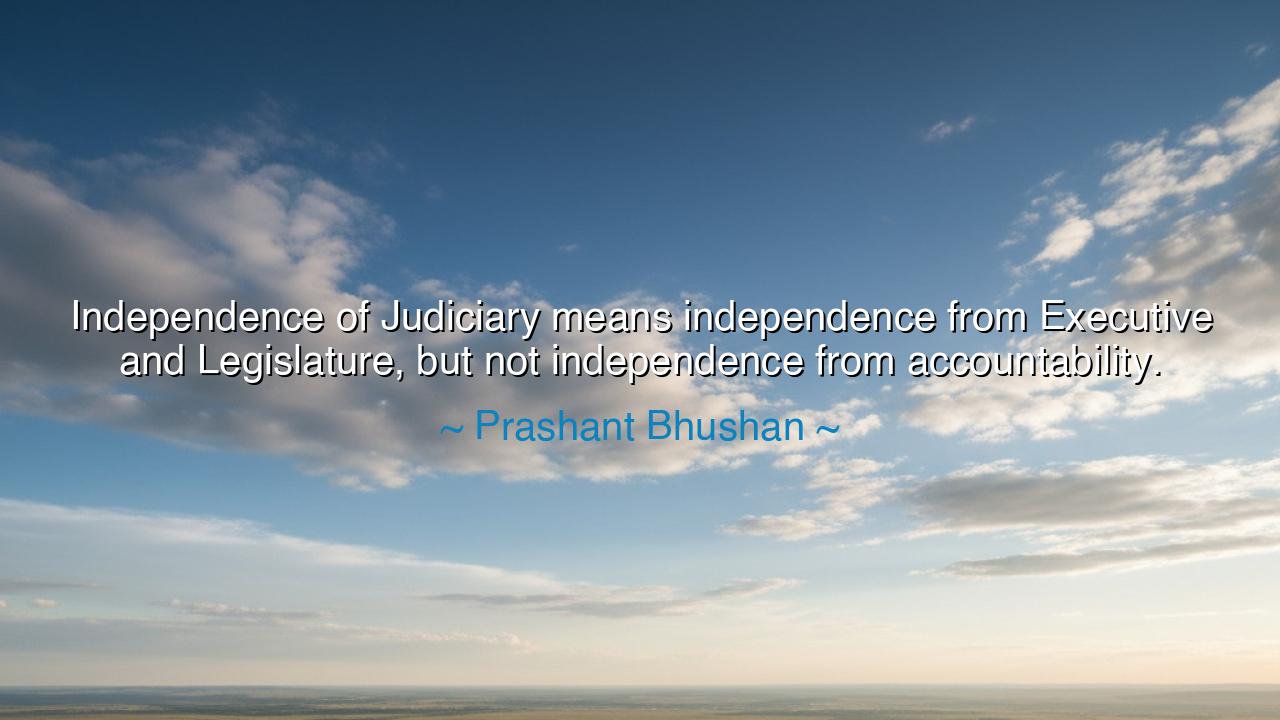
Independence of Judiciary means independence from Executive and
Independence of Judiciary means independence from Executive and Legislature, but not independence from accountability.






There are truths in governance as ancient as civilization itself — that power must be balanced by virtue, and that authority must be restrained by conscience. When Prashant Bhushan declared, “Independence of Judiciary means independence from Executive and Legislature, but not independence from accountability,” he was reminding both rulers and citizens of this sacred law. His words are not merely a warning to those who wield the gavel, but a hymn to justice itself — that the guardian of law must be free to act without fear, yet never so free as to forget its duty to the people it serves.
The origin of this thought lies in the eternal tension between freedom and responsibility. In every age, societies have wrestled with this paradox: how to grant the judiciary the independence it needs to judge without influence, while ensuring it does not become a power unto itself. In Bhushan’s homeland, India, this question is not abstract — it was forged through real struggle. Emerging from the shadow of colonial rule, India’s founders envisioned a republic where no branch of government — Executive, Legislature, or Judiciary — could dominate the others. Yet over time, the temptation of unchecked authority has crept into each, and thus Bhushan speaks, as a modern reformer, to restore equilibrium: that the independence of judges must never become the isolation of judgment.
To be independent from the Executive and Legislature is to stand firm against external pressure — to ensure that justice is not swayed by the commands of kings or the whims of politicians. This is the first pillar of a free judiciary: fearlessness. A judge must be able to strike down tyranny, even when it comes cloaked in law; to defend truth even when power stands against it. This was the spirit of Justice H.R. Khanna, who during India’s dark Emergency of 1975, stood alone against the government’s attempt to strip citizens of their fundamental rights. He ruled that liberty is not a gift from rulers, but the inheritance of humanity. For his courage, he was punished — yet his name is now remembered in reverence. Thus, independence from power is not a luxury; it is the lifeblood of justice itself.
But Bhushan’s insight shines in what follows — for he warns that independence without accountability is no virtue, but arrogance disguised as freedom. When judges are free from all scrutiny, the very institution meant to safeguard justice may become a fortress of impunity. History offers painful lessons of this truth. In the waning days of the Roman Republic, judges, once revered for fairness, became corrupt servants of the elite, untouchable by law. Their “independence” became decay, and justice, once the soul of Rome, turned to dust beneath the sandals of power. Rome did not fall by invasion alone — it fell when its guardians ceased to answer to the people.
Accountability, then, is not the enemy of independence; it is its companion and its conscience. For just as sunlight keeps the temple clean, so transparency keeps the halls of justice pure. A judiciary that listens to no one becomes deaf to truth; a judge who fears no question grows blind to humility. The balance Bhushan calls for is the golden mean between subservience and supremacy — the condition in which freedom and duty sustain each other. Independence must give the judiciary courage; accountability must give it wisdom.
The story of Lord Denning, the great British jurist, illustrates this harmony. He was fiercely independent, unafraid to question even the Crown itself, yet he always believed that a judge must serve the public good. “Justice is not a cloistered virtue,” he said, “it must be allowed to suffer the scrutiny and respectful, even though outspoken, comments of ordinary men.” Denning’s greatness lay not in his power, but in his answerability — his understanding that justice lives only when it remains connected to the people.
So, my child, learn this lesson and guard it well: true independence is never separation from duty. Whether you are a judge, a teacher, or a leader, let your freedom be anchored in responsibility. Speak truth without fear, but welcome the gaze of those you serve. For in every realm — from the courtroom to the soul — independence without accountability breeds tyranny, while accountability without independence breeds slavery. Between these two lies the sacred path of justice, where liberty stands tall, and humility kneels beside it. Walk that path, and you will not merely wield power — you will honor it.






AAdministratorAdministrator
Welcome, honored guests. Please leave a comment, we will respond soon